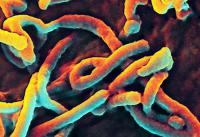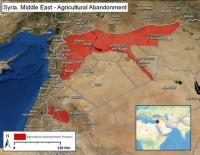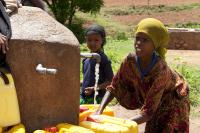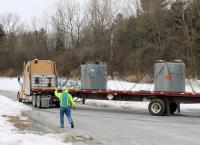-
Ebola no longer a “Public Health Emergency of International Concern”: WHO

On Tuesday the WHO officials met to consider the Ebola virus disease (EVD) outbreak in West Africa, and to decide whether the event continues to constitute a Public Health Emergency of International Concern (PHEIC) and whether the current Temporary Recommendations should be extended, rescinded, or revised. WHOconcluded that Ebola transmission in West Africa no longer constitutes an extraordinary event, that the risk of international spread is now low, and that countries currently have the capacity to respond rapidly to new virus emergences. Accordingly, the Ebola situation in West Africa no longer constitutes a Public Health Emergency of International Concern, and the temporary recommendations adopted in response should now be terminated.
-
-
Protecting soldiers from emerging infectious diseases
Emerging infectious diseases that the U.S. military could encounter around the globe, particularly those found in tropical settings such as dengue, Burkholderia melioidosis, and malaria, are often difficult to distinguish by their clinical characteristics alone. Scientists from the Naval Health Research Center (NHRC) and the Defense Threat Reduction Agency (DTRA) held a two-day meeting earlier this month to discuss progress and goals for a joint biosurveillance project which aims to develop novel point of need (PON) diagnostics to identify pathogens that cause acute febrile illnesses and threaten global and public health.
-
-
New biotechnology improves crop performance

With the world’s population exploding to well over seven billion, feeding the human race is getting even more challenging. Increasing the yield from crops such as wheat, maize, rice and barley, is paramount to growing enough food. In addition, crop production is now affected by stressors such as drought, climate change, and the salinization of fields — presenting obstacles to our future food supply. Rsearchers have discovered a way to enhance a plant’s tolerance to stress, which in turn improves how it uses water and nutrients from the soil. These improvements increase plant biomass and yield.
-
-
Expanding use of recycled water would benefit the environment, human health
More than 1 in 9 people around the world, about 750 million, do not have access to safe, clean drinking water, and the problem is expected to worsen in step with rising greenhouse gas concentrations, population increases and climate change. Researchers found that found that recycled water has great potential for more efficient use in urban settings and to improve the overall resiliency of the water supply.
-
-
Better tracking of police homicides
Official counts of homicides by police seriously undercount incidents, according to a study, but a relatively new national data system, currently in use in thirty-two states, could be a crucial tool for gathering more comprehensive information, say the researchers.
-
-
Conditions increasing Zika virus risk present in many U.S. cities
Key factors that can combine to produce a Zika virus outbreak are expected to be present in a number of U.S. cities during peak summer months. The Aedes aegypti mosquito, which is spreading the virus in much of Latin America and the Caribbean, will likely be increasingly abundant across much of the southern and eastern United States as the weather warms, according to a new study.
-
-
Fertilizer applied to fields today will contaminate water for decades
Nitrogen fertilizer applied to farmers’ fields has been contaminating rivers and lakes and leaching into drinking water wells for more than eighty years. Dangerous nitrate levels in drinking water could persist for decades, increasing the risk for blue baby syndrome and other serious health concerns.
-
-
Global warming increases rainfall in world's driest areas

Global warming will increase rainfall in some of the world’s driest areas over land, with not only the wet getting wetter but the dry getting wetter as well — a phenomenon that could lead to more flash flooding.
-
-
Impact of climate change on agriculture may be underestimated
Studies of how climate change might affect agriculture generally look only at crop yields — the amount of product harvested from a given unit of land. But climate change may also influence how much land people choose to farm and the number of crops they plant each growing season. A new study takes all of these variables into account, and suggests researchers may be underestimating the total effect of climate change on the world’s food supply.
-
-
Syria’s 1998-2012 drought likely its most severe in more than 900 years

In the years before the Syrian conflict erupted, the region’s worst drought on record set in across the Levant, destroying crops and restricting water supplies in the already water-stressed region. A new study shows that that drought, from 1998 to 2012, was not just the most severe in a century of record-keeping — it was the Levant’s most severe drought in at least 500 years and likely more than 900 years.
-
-
Resources used for biofuel reduce resources available for food production
As strategies for energy security, investment opportunities and energy policies prompt ever-growing production and consumption of biofuels like bioethanol and biodiesel, land, and water that could otherwise be used for food production increasingly are used to produce crops for fuel. A new study shows about a third of the world’s malnourished population could be fed by using resources now used for biofuel production.
-
-
Climate change impact on food production could cause 500,000 extra deaths in 2050
Climate change could kill more than 500,000 adults in 2050 worldwide due to changes in diets and bodyweight from reduced crop productivity. The research, published yesterday in The Lancet, is the strongest evidence yet that climate change could have damaging consequences for food production and health worldwide. The study found that by 2050, reduced fruit and vegetable intake could cause twice as many deaths as under-nutrition, and that three-quarters of all climate-related deaths due to changes in food production are estimated to occur in China and India.
-
-
Cloud-based biosurveillance ecosystem

The Departments of Defense and Homeland Security are developing a system which lets epidemiologists scan the planet for anomalies in human and animal disease prevalence, warn of coming pandemics, and protect soldiers and others worldwide.
-
-
Water storage strategies in Sub-Sahara Africa

Direct abstraction of water from rivers through ponds and pumping devices seems the most attractive water storage option in Ethiopia. However, the funding agencies that may be interested in investing in such a storage system have to consider that better access to credit, and clear abstraction policies should be ensured.
-
-
Truck carrying toxic nuclear materials stolen in Mexico

Five Mexican states have been placed on a state of alert after a truck carrying a container of dangerous radioactive material was stolen, the Mexican Interior Ministry has said. The material could cause permanent or serious injury to a person who is in contact with it for a short time, and is fatal when exposure lasts for more than a few hours.
-
More headlines
The long view
A Shining Star in a Contentious Legacy: Could Marty Makary Be the Saving Grace of a Divisive Presidency?
While much of the Trump administration has sparked controversy, the FDA’s consumer-first reforms may be remembered as its brightest legacy. From AI-driven drug reviews to bans on artificial dyes, the FDA’s agenda resonates with the public in ways few Trump-era policies have.
